Looking for some recommended reading about Israeli advocacy? Type the search term into Amazon.com and you will be confronted with literally hundreds of books on the subject. So which ones to choose? How do you know if the author or the book is a trustworthy source let alone a decent read?
We’ve come up with a selection (in no particular order of preference) of some of the best materials based on our knowledge of the subject materials and the authors themselves.
You can click on the title to find the book on Amazon.
Note: Synopses are those published on Amazon.com and not written by HonestReporting staff.
1. The Case for Israel, Alan Dershowitz
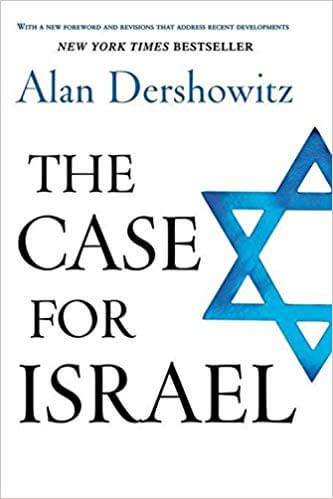 The Case for Israel is an ardent defense of Israel’s rights, supported by indisputable evidence.
The Case for Israel is an ardent defense of Israel’s rights, supported by indisputable evidence.
- Presents a passionate look at what Israel’s accusers and detractors are saying about this war-torn country.
- Dershowitz accuses those who attack Israel of international bigotry and backs up his argument with hard facts.
- Widely respected as a civil libertarian, legal educator, and defense attorney extraordinaire, Alan Dershowitz has also been a passionate though not uncritical supporter of Israel.
2. The Case Against BDS: Why Singling Out Israel for Boycott Is Anti-Semitic and Anti-Peace, Alan Dershowitz
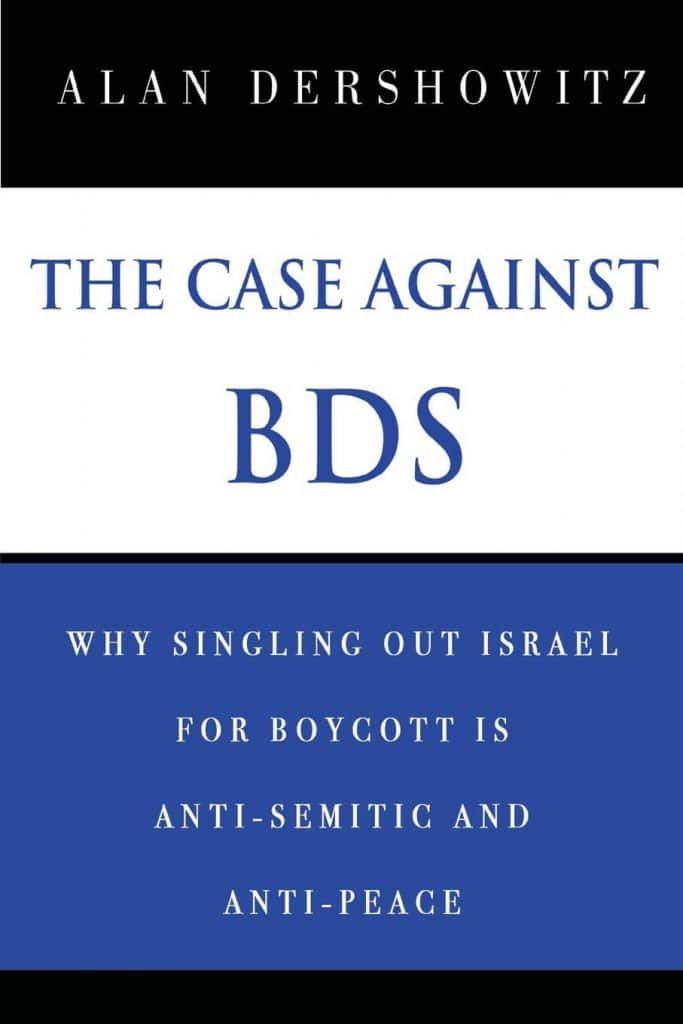 The world is a very dangerous place for the State of Israel. It is besieged by domestic terrorism, bordered by armies bent on its destruction, and targeted by Iranian missiles capable of raining chemical or nuclear destruction on its cities.
The world is a very dangerous place for the State of Israel. It is besieged by domestic terrorism, bordered by armies bent on its destruction, and targeted by Iranian missiles capable of raining chemical or nuclear destruction on its cities.
In a never-ending attempt to destroy Israel, Muslim countries, the international Left, and anti-Semites of all political stripes have joined forces to create a worldwide campaign aimed at the complete economic and cultural isolation of the Jewish State. BDS aims to de-legitimize Israel’s very existence-barring it from international organizations, cultural exchanges, and global economic activity.
Based on the absurd notion that Israel is equivalent to South Africa under Apartheid, BDS activists portray Israel as a racist and genocidal nation. This fantastical notion is gaining traction, with the potential to cause serious damage to Israel’s economy, reputation, and, eventually, security-clearly the aim of BDS proponents.
The Case Against BDS is a must-read for all people of goodwill who support Israel’s right to exist. Only by shining sunlight on the shady origins and dishonest methods of BDS can we hope to defeat it.
3. The Anti-Israel Agenda: Inside the Political War on the Jewish State, Alex Ryvchin
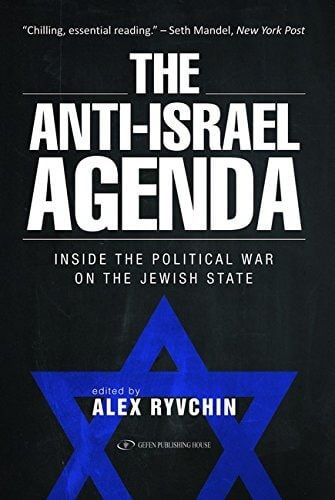 Since 1948, Israel has withstood three full-scale invasions on multiple fronts, bloody wars with Palestinian militias, deadly bombings of its diplomatic missions, and hundreds of terrorist attacks within its territory and against its citizens abroad. This violence has inflicted immense suffering and loss on the people of Israel, but the country has emerged from armed conflict with more territory rather than less, while its permanent preparedness for war has ensured that the full weight of Israeli innovation has been thrown behind the country’s military, turning it into the most formidable fighting force in the region.
Since 1948, Israel has withstood three full-scale invasions on multiple fronts, bloody wars with Palestinian militias, deadly bombings of its diplomatic missions, and hundreds of terrorist attacks within its territory and against its citizens abroad. This violence has inflicted immense suffering and loss on the people of Israel, but the country has emerged from armed conflict with more territory rather than less, while its permanent preparedness for war has ensured that the full weight of Israeli innovation has been thrown behind the country’s military, turning it into the most formidable fighting force in the region.
In light of Israel’s military prowess, its enemies have opened a new front in their war of annihilation: a full-scale political assault on Israel’s legitimacy. The Anti-Israel Agenda reveals how the institutions of greatest moral and political influence including Western governments, the campus, the United Nations, and the Church are being turned against Israel in an effort to isolate and cripple the state until it can no longer defend its interests or its people.
Bringing together the finest minds devoted to the Arab-Israeli conflict, including Alan Dershowitz, Alan Johnson, Col. Richard Kemp, and Hillel Neuer, this powerful and timely exposé reveals how the conflict with Israel has shifted from the battlefield to the corridors of power, the media we consume, the campuses we attend, and every forum that touches our lives. Engrossing and authoritative, The Anti-Israel Agenda is essential to understanding war and conflict in today’s Middle East.
Read HonestReporting’s book review here.
4. Making David into Goliath: How the World Turned Against Israel, Joshua Muravchik
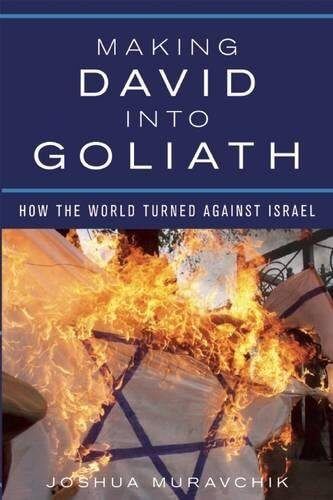 During the Six Day War of 1967, polls showed that Americans favored the Israelis over the Arabs by overwhelming margins. In Europe, support for Israel ran even higher. In the United Nations Security Council, a British resolution essentially gave Israel the terms of peace it sought and when the Arabs and their Soviet supporters tried to override the resolution in the General Assembly, they fell short of the necessary votes.
During the Six Day War of 1967, polls showed that Americans favored the Israelis over the Arabs by overwhelming margins. In Europe, support for Israel ran even higher. In the United Nations Security Council, a British resolution essentially gave Israel the terms of peace it sought and when the Arabs and their Soviet supporters tried to override the resolution in the General Assembly, they fell short of the necessary votes.
Fast forward 40 years and Israel has become perhaps the most reviled country in the world. Although Americans have remained constant in their sympathy for the Jewish state, almost all of the rest of the world treats Israel as a pariah.
What caused this remarkable turnabout? Making David into Goliath traces the process by which material pressures and intellectual fashions reshaped world opinion of Israel. Initially, terrorism, oil blackmail, and the sheer size of Arab and Muslim populations gave the world powerful inducements to back the Arab cause. Then, a prevalent new paradigm of leftist orthodoxy, in which class struggle was supplanted by the noble struggles of people of color, created a lexicon of rationales for taking sides against Israel. Thus, nations can behave cravenly while striking a high-minded pose in aligning themselves on the Middle East conflict.
Related Reading: Top 10 Israel History Books
5. Industry of Lies: Media, Academia, and the Israeli-Arab Conflict, Ben-Dror Yemini
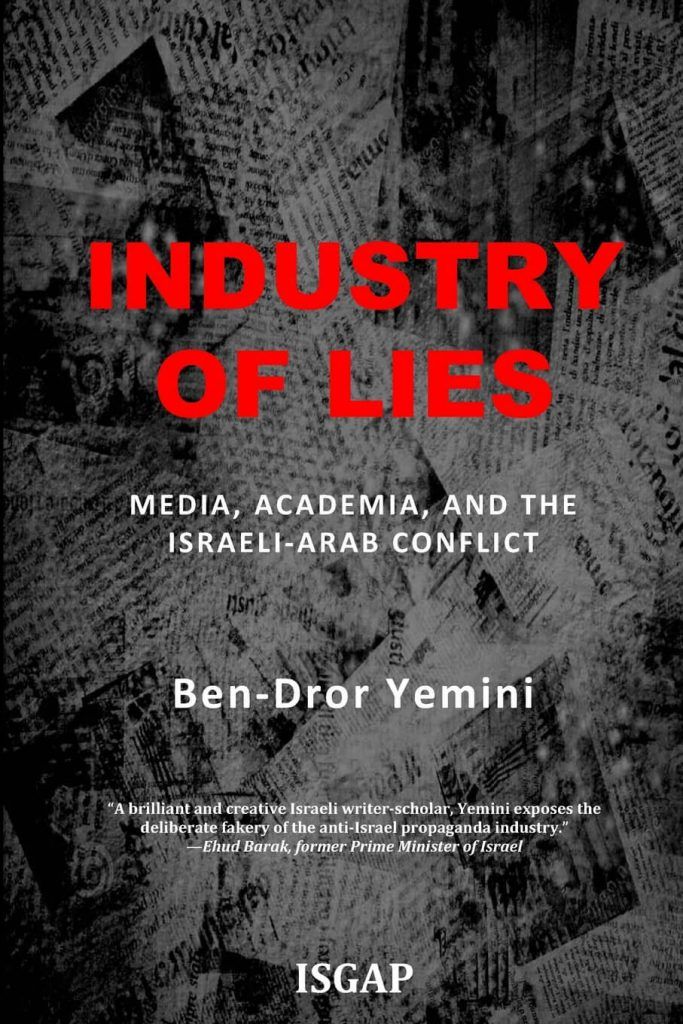 The Industry of Lies is one of the greatest frauds of recent decades – a fraud of historic, even epic, proportions. When almost half of all Europeans believe that Israel treats the Palestinians just like the Nazis treated the Jews, when leading politicians assert that the Arab-Israeli conflict is the central cause of violence in the world, and when prominent intellectuals argue that Israel is an apartheid state, the unfortunate reality is that the lies are winning.
The Industry of Lies is one of the greatest frauds of recent decades – a fraud of historic, even epic, proportions. When almost half of all Europeans believe that Israel treats the Palestinians just like the Nazis treated the Jews, when leading politicians assert that the Arab-Israeli conflict is the central cause of violence in the world, and when prominent intellectuals argue that Israel is an apartheid state, the unfortunate reality is that the lies are winning.
As a result, Israel has become the devil incarnate in the eyes of many otherwise good and reasonable people – people who genuinely want to see peace but inadvertently contribute to the continuation of the Israeli-Arab conflict. The tragedy is that they are neither helping the Palestinians nor promoting agreement or reconciliation. Instead, they lend legitimacy to the most fallacious claims of the most extreme activists, empowering not moderates but the worst of the radicals who have no interest in attaining peace.
Israel is not free from flaws. However, this book draws a clear distinction between legitimate criticism and the industry of lies that has emerged from two unlikely sources – the media and academia – undermining their reputation as bastions of truth and knowledge. Ben-Dror Yemini presents an in-depth analysis of the many inaccurate and malicious accusations leveled against Israel and refutes them one by one in this thought-provoking and well-researched volume that invites us to rethink the causes and consequences of the Israeli-Arab conflict.
6. Winning the War of Words: Essays on Zionism and Israel, Einat Wilf
 From the United Nations to the media, and from academia to international NGOs, the attacks on Israel’s legitimacy as the nation-state of the Jewish people are growing. To win this war of words, Israel’s defenders must be able to clearly explain the ideas and circumstances that led to the creation of modern Israel and underpin its existence today. In this single-volume collection, Dr. Einat Wilf does just that, presenting her top essays on the Middle East, Israel, Zionism, and public diplomacy. In the book’s opening chapter, “The Dangerous Unraveling of the Middle East,” Wilf explains that the violent upheaval in the Middle East of today will take decades to sort itself out and that Israel should position itself as a “neutral bunker” in the region. In chapter two, “The International Community and the Limits of Good Intentions,” Wilf urges world powers to reexamine the paradigm through which they approach the Israeli-Palestinian conflict. Wilf focuses on the negative role played by the United Nations Relief and Works Agency (UNRWA), which makes peace harder to achieve by inflating the number of Palestinian refugees and encouraging them to believe that Israel will one day disappear. In chapter three, “A Vision for Peace,” Wilf presents a formula for Israeli-Palestinian peace based on the concept of “two states for two peoples” – a Jewish state for the Jewish people, and a Palestinian state for the Palestinian people, with each people enjoying dignity and sovereignty in their own national home. She also presents an inclusive vision of Zionism in which Jews, Christians, and Muslims live in harmony with a shared purpose. In chapter four, “Telling Our Story,” Wilf reminds readers that the story of the Zionist movement is among the most inspiring dramas in human history and that it can continue to move people today. With this in mind, Wilf insists that the creation of Israel must not be portrayed as the outcome of the Holocaust, because such “Zionism denial” robs the Jewish people of their role in reviving their ancient homeland in the decades before World War II. Also in this chapter, Wilf shares her experiences as a “roving ambassador” for Israel and offers advice on how best to make Israel’s case for an audience that is eager for more than sound bites. In the concluding chapter, “On Other Matters: Elections, Education, and Entitlement,” Wilf defends her contrarian position that Israel’s electoral system is no worse than other democratic countries’ systems and should not be reformed. She also shares her thoughts on how to improve Israel’s education system by focusing on the fundamentals rather than sweeping reforms. Finally, she ends with some advice for recent graduates on how to achieve their life’s dreams.
From the United Nations to the media, and from academia to international NGOs, the attacks on Israel’s legitimacy as the nation-state of the Jewish people are growing. To win this war of words, Israel’s defenders must be able to clearly explain the ideas and circumstances that led to the creation of modern Israel and underpin its existence today. In this single-volume collection, Dr. Einat Wilf does just that, presenting her top essays on the Middle East, Israel, Zionism, and public diplomacy. In the book’s opening chapter, “The Dangerous Unraveling of the Middle East,” Wilf explains that the violent upheaval in the Middle East of today will take decades to sort itself out and that Israel should position itself as a “neutral bunker” in the region. In chapter two, “The International Community and the Limits of Good Intentions,” Wilf urges world powers to reexamine the paradigm through which they approach the Israeli-Palestinian conflict. Wilf focuses on the negative role played by the United Nations Relief and Works Agency (UNRWA), which makes peace harder to achieve by inflating the number of Palestinian refugees and encouraging them to believe that Israel will one day disappear. In chapter three, “A Vision for Peace,” Wilf presents a formula for Israeli-Palestinian peace based on the concept of “two states for two peoples” – a Jewish state for the Jewish people, and a Palestinian state for the Palestinian people, with each people enjoying dignity and sovereignty in their own national home. She also presents an inclusive vision of Zionism in which Jews, Christians, and Muslims live in harmony with a shared purpose. In chapter four, “Telling Our Story,” Wilf reminds readers that the story of the Zionist movement is among the most inspiring dramas in human history and that it can continue to move people today. With this in mind, Wilf insists that the creation of Israel must not be portrayed as the outcome of the Holocaust, because such “Zionism denial” robs the Jewish people of their role in reviving their ancient homeland in the decades before World War II. Also in this chapter, Wilf shares her experiences as a “roving ambassador” for Israel and offers advice on how best to make Israel’s case for an audience that is eager for more than sound bites. In the concluding chapter, “On Other Matters: Elections, Education, and Entitlement,” Wilf defends her contrarian position that Israel’s electoral system is no worse than other democratic countries’ systems and should not be reformed. She also shares her thoughts on how to improve Israel’s education system by focusing on the fundamentals rather than sweeping reforms. Finally, she ends with some advice for recent graduates on how to achieve their life’s dreams.
7. Myths and Facts: A Guide to the Arab-Israeli Conflict, Mitchell G. Bard
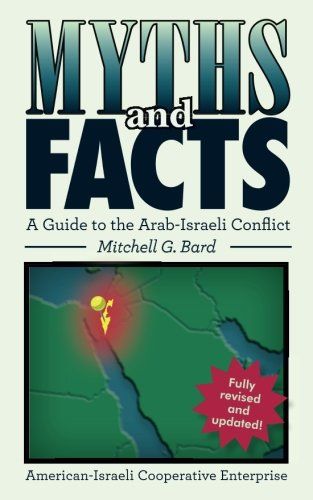 In the last sixty years, Israel has faced seven different wars. During that time, the country has been under immense scrutiny and been the recipient of false accusations. This leaves the public with many questions: Does Israel want peace with the Arab nations? How do Islamic views affect Israel?
In the last sixty years, Israel has faced seven different wars. During that time, the country has been under immense scrutiny and been the recipient of false accusations. This leaves the public with many questions: Does Israel want peace with the Arab nations? How do Islamic views affect Israel?
Using a number of sources, Mitchell G. Bard uncovers Israel’s true history. His book includes the following:
· A discussion of various wars involving Israel (including the war of 1948)
· Multiple maps that help the reader visualize the wars
· An analysis of terrorism directed at Israel
· An alphabetical index
· A discussion of the media’s role in how it portrays Israel
· A review of successful and unsuccessful peace efforts
· An overview of US-Israel relations
Bard also offers a synopsis of Israel’s roots, beginning with the great myth: that the Jews have no claim to their own land. Bard focuses on Israel’s relationships with neighboring countries, but he also includes suggested readings for those interested in further research. You’ll learn about the Jewish Virtual Library, an online source that’s constantly updated and offers reliable options for study.
Dive into this versatile read as Bard investigates common myths about Israel and reveals the truth.
Liked this article? Follow HonestReporting on Twitter, Facebook, Instagram and TikTok to see even more posts and videos debunking news bias and smears, as well as other content explaining what’s really going on in Israel and the region.
New! Skip the social scroll and get the latest from HonestReporting via Telegram.


